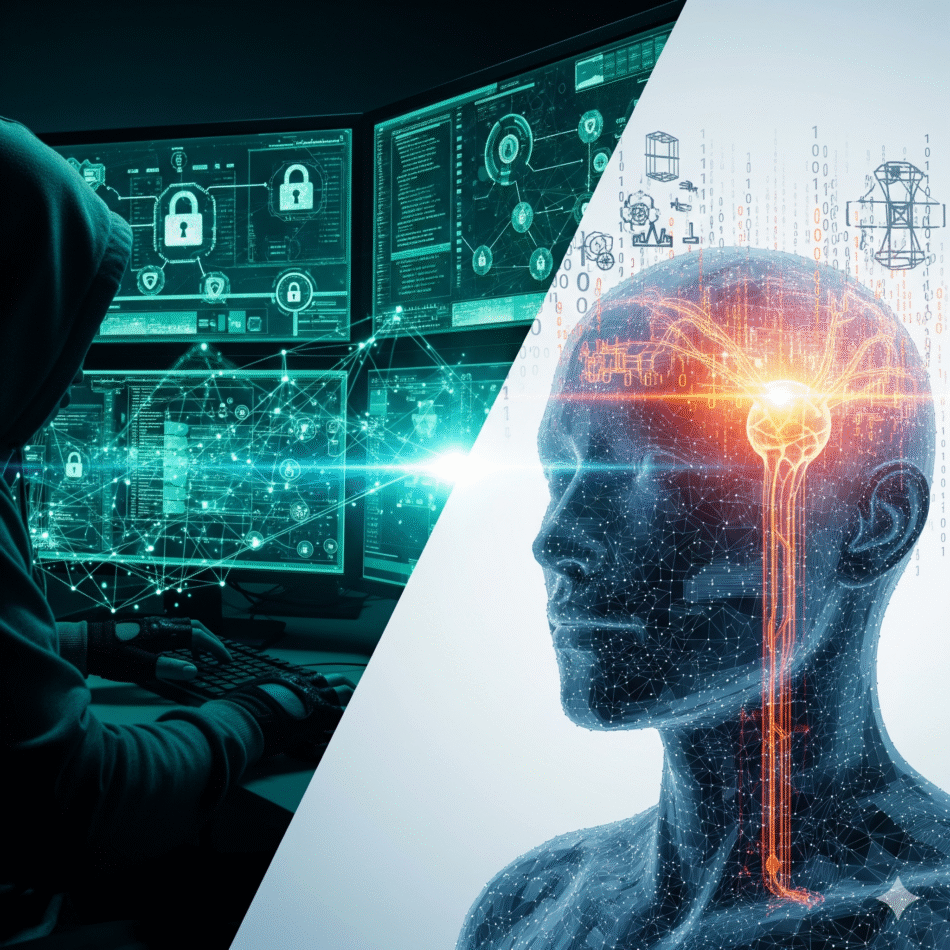In today’s digital-first world, two of the most sought-after career paths are cybersecurity and artificial intelligence (AI). Both fields are rapidly growing, highly impactful, and essential for modern businesses. However, many beginners often ask the question: which is easy cybersecurity or artificial intelligence?
The answer is not as straightforward as choosing one over the other. Both fields require different skill sets, levels of expertise, and long-term commitment. In this article, we will break down the differences between cybersecurity and AI, their learning curves, required skills, and career opportunities to help you decide which one may be easier for you.
Understanding Cybersecurity
Cybersecurity is the practice of protecting systems, networks, and data from cyber threats such as hacking, phishing, ransomware, and other malicious activities. It focuses on ensuring confidentiality, integrity, and availability of information.
Core Responsibilities in Cybersecurity:
- Securing networks and systems from unauthorized access
- Monitoring and detecting threats in real-time
- Implementing firewalls, intrusion detection systems, and encryption
- Conducting penetration testing and vulnerability assessments
- Ensuring compliance with security standards and regulations
Cybersecurity is crucial because every organization—whether small businesses or large corporations—faces constant digital threats. This demand makes cybersecurity experts highly valuable.
Understanding Artificial Intelligence
Artificial intelligence refers to the simulation of human intelligence in machines that can perform tasks such as problem-solving, learning, decision-making, and language processing. AI applications are everywhere—from recommendation engines on Netflix to autonomous vehicles and smart assistants like Siri or Alexa.
Core Responsibilities in Artificial Intelligence:
- Designing and training machine learning models
- Working with large datasets for data analysis
- Building algorithms for predictive and cognitive systems
- Developing natural language processing (NLP) solutions
- Optimizing AI models for efficiency and scalability
AI is a highly technical field that relies heavily on mathematics, statistics, and computer science. It’s the driving force behind innovations like generative AI, robotics, and computer vision.
Which is Easy Cybersecurity or Artificial Intelligence?
Now let’s address the core question: which is easy cybersecurity or artificial intelligence? The answer depends largely on your background, interests, and long-term goals.
Learning Curve Comparison
- Cybersecurity: Easier to get started with, especially for those with basic IT or networking knowledge. Beginners can learn the fundamentals of network security, ethical hacking, or security operations relatively quickly. Certifications like CompTIA Security+ or Certified Ethical Hacker (CEH) can help newcomers start their careers without requiring advanced degrees.
- Artificial Intelligence: Has a steeper learning curve. To succeed, you need a strong foundation in mathematics (linear algebra, probability, calculus), programming (Python, R), and data science. AI projects often require advanced problem-solving and continuous research.
Technical Complexity
- Cybersecurity focuses more on practical defense strategies, tools, and real-world problem-solving.
- AI requires deep theoretical knowledge along with hands-on experience in building and optimizing models.
Verdict: For beginners without a strong background in advanced mathematics, cybersecurity may feel easier than AI.
Skills Required for Each Field
Cybersecurity Skills:
- Networking and operating system knowledge
- Cyber defense tools (firewalls, SIEM, IDS/IPS)
- Ethical hacking and penetration testing
- Risk assessment and compliance
- Security scripting (Python, Bash)
Artificial Intelligence Skills:
- Mathematics (linear algebra, statistics, probability)
- Programming (Python, TensorFlow, PyTorch, R)
- Machine learning and deep learning concepts
- Data preprocessing and visualization
- Natural language processing and computer vision
Which is easy cybersecurity or artificial intelligence? It depends on your personal strengths. If you’re good at problem-solving and systems security, cybersecurity might be easier. If you enjoy working with data, algorithms, and advanced research, AI might suit you better.
Career Opportunities and Salary Potential
Cybersecurity Careers:
- Security Analyst
- Ethical Hacker / Penetration Tester
- Security Engineer
- Incident Responder
- Chief Information Security Officer (CISO)
Artificial Intelligence Careers:
- Machine Learning Engineer
- Data Scientist
- AI Research Scientist
- Natural Language Processing Engineer
- AI Product Manager
According to industry reports, both fields offer lucrative salaries. Cybersecurity experts earn an average salary ranging from $90,000 to $150,000 annually, while AI professionals can earn between $100,000 and $160,000, depending on specialization and experience.
Industry Demand and Growth
Both cybersecurity and AI are projected to grow significantly in the next decade.
- Cybersecurity demand is fueled by the rise in cyberattacks, ransomware, and data breaches. Every organization, regardless of industry, requires cybersecurity professionals.
- AI demand is fueled by automation, big data, and the adoption of AI-driven technologies across industries like healthcare, finance, automotive, and entertainment.
The U.S. Bureau of Labor Statistics predicts a 35% growth in cybersecurity jobs and a 21% growth in AI and data science jobs over the next decade.
Which is More Suitable for Beginners?
If you’re asking yourself which is easy cybersecurity or artificial intelligence, here’s a practical breakdown:
- Choose cybersecurity if:
- You prefer hands-on, practical skills.
- You have a background in IT, networking, or computer science.
- You want certifications to quickly enter the job market.
- You enjoy protecting systems and fighting cybercrime.
- Choose AI if:
- You enjoy working with data and algorithms.
- You have strong math and programming skills.
- You are interested in research and cutting-edge innovation.
- You want to be part of AI-driven advancements shaping the future.
Final Thoughts
When deciding which is easy cybersecurity or artificial intelligence, it’s important to remember that “easy” is relative. Cybersecurity may be more accessible for beginners since it builds upon IT and networking fundamentals. AI, on the other hand, is more challenging due to its reliance on advanced mathematics and programming.
Both fields, however, are rewarding, in-demand, and offer long-term career stability. Instead of focusing only on which is easier, consider your personal interests, strengths, and long-term career goals. Whether you choose cybersecurity or AI, investing in continuous learning will ensure success in this fast-changing digital world.
 WhatsApp Us Now
WhatsApp Us Now






